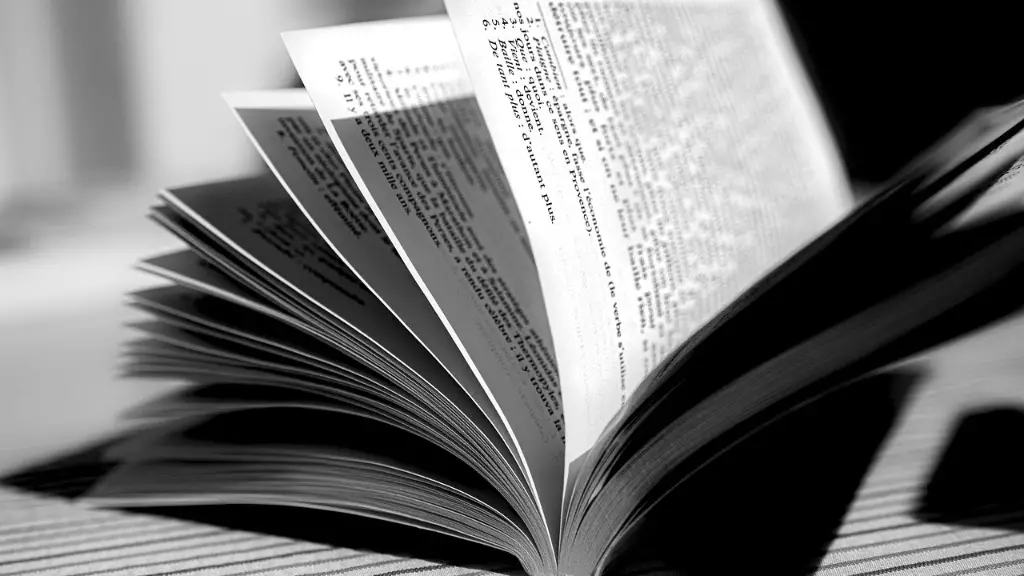Metaphysical poetry is a type of poetry that uses philosophical and spiritual elements in an attempt to explore surreal and significant aspects of the human experience. Dating back to the 17th century, metaphysical poetry is often characterized as having intricate and layered meanings, as well as a sometimes difficult structure and language. It is one of the most well-known and respected forms of poetry, and it remains relevant and influential today.
The most prominent feature of metaphysical poetry is its intellectual approach to themes such as love, death and the afterlife. This intellectual approach is reflected in the style and structure of the poems, which often use metaphors and complex imagery to explore complex philosophical and spiritual ideas. Metaphysical poetry is often abstract in nature and is composed of long lines of verse that are often difficult to understand without considerable effort. In addition, these poems often contain elements of satire, as well as references to classical literature and mythology.
Metaphysical poetry is also notable for its use of wit and irony. Metaphysical poets often employ humor, irony and satiric devices to provide an interesting and thought-provoking response to the human condition. The use of wit draws the reader’s attention to the poem’s deeper meaning and the intellectual scope of the poem’s ideas. As a result, the reader is left with a complex and thought-provoking understanding of the poem’s themes.
Another prominent feature of metaphysical poetry is its quality as a ‘reflection on life’. Many metaphysical poets sought to provide an answer to the universal questions of life, love and death, and thus their poems often expressed a deep personal reflection on these aspects of human experience. This reflection was expressed through thoughtful and insightful poetic language, often presented in a form that was both challenging and accessible to the reader. In this way, the metaphysical poet sought to challenge the reader to explore and engage with the poem’s ideas, ultimately leading to a deeper understanding.
One of the most striking features of metaphysical poetry is its intricate use of imagery. Metaphysical poets often used imagery and figurative language to evoke a particular emotion or idea, while simultaneously exploring the complex philosophical and spiritual concepts that were being addressed. This imagery could take the form of animals, plants, weather or abstract concepts such as ‘time’ or ‘fate’. In this way, metaphysical poets were able to explore the complexities of the human condition in a poetic form that was both imaginative and insightful.
Metaphysical poetry is also distinctive in its use of language. Many metaphysical poets sought to create a poetic form that was both challenging and accessible to the reader, employing both traditional forms of language use and complex and inventive metaphors. This combination of language use has led to the development of a poetry form that is both powerful and captivating, allowing readers to explore and engage with the poem’s ideas while being presented with a unique and thought-provoking exploration of the world.
Exploring the Themes of Metaphysical Poetry
Metaphysical poetry often explores the major themes of life, love and death, as well as the ideas of fate, destiny and free will. These themes are explored from both a philosophical and spiritual standpoint, as metaphysical poets often used complex metaphors and imagery to provide an interesting and thought-provoking response to these universal questions. In this way, readers are able to gain an insight into the complex and varied ways of looking at these issues, and to come away with a deeper understanding of the human experience.
In addition to exploring the major themes of life, many metaphysical poets also addressed themes of morality, such as justice and injustice, and the nature of good and evil. These topics were often explored in the context of the poem’s broader philosophical and spiritual scope, with many metaphysical poets using the poetical form to provide a unique and thought-provoking exploration of these moral issues.
Metaphysical poetry is also notable for its use of wit and playfulness, as well as its use of irony. Metaphysical poets often used humor and irony to provide an interesting and thought-provoking response to the human experience, while simultaneously exploring the complexity of the poem’s themes. This humor and playfulness is often infused with a subtle underlying message that encourages readers to explore and engage with the poem’s ideas to gain a deeper understanding.
The Legacy of Metaphysical Poetry
Metaphysical poetry has a long and enduring legacy, and it continues to be an influential form of poetry today. Many metaphysical poets are recognized for their seminal works of poetry and for their influence on later generations of poets, and their works are still studied and appreciated today. In addition, many modern poets still employ many of the features of metaphysical poetry, such as its intellectual approach to themes, its use of imagery and its use of wit and irony.
The lasting legacy of metaphysical poetry is reflective of the breadth and depth of its ideas and its ability to provide readers with an engaging and thought-provoking exploration of the human experience. In this sense, metaphysical poetry continues to be a powerful and captivating form of poetry, providing insight and reflection on life, love and death, as well as morality and the nature of good and evil.
Exploring the Poetic Techniques of Metaphysical Poets
Metaphysical poets employed an array of poetic techniques to create their works, many of which are still employed by poets today. These techniques included the use of complex metaphors, imagery, ironic devices and wit to explore complex themes such as life, love and death. In addition, these poets often employed traditional forms of language use as well as complex and inventive metaphors to express their themes.
Many metaphysical poets also employed a range of poetic structures, often crafting intricate rhyming patterns and utilizing traditional forms of poetic meters. This poetic craftsmanship was often combined with an unconventional approach to language use, often presenting the reader with a unique and challenging linguistic experience.
The use of such poetic techniques enabled metaphysical poets to explore the depths of the human experience in a unique and captivating manner. By employing intricate and complex poetic techniques, metaphysical poets were able to provide readers with an insightful and thought-provoking journey into the mysteries of the world.
The Impact of Metaphysical Poetry
The impact of metaphysical poetry extends beyond its own unique form of literature. As one of the most influential forms of poetry, metaphysical poetry has had a profound influence on modern poetry and literature. The complex, intellectual and often witty approach to exploring the universal questions of life, love and death have provided later generations of poets and authors with a powerful form of expression, encouraging them to explore and engage with their own ideas and perspectives.
The influence of metaphysical poetry can also be seen in the way it has helped shape our understanding of and approach to life, love and death. By providing thoughtful, profound and often humorous insights into life, love and death, metaphysical poets have helped to create a more sophisticated and nuanced approach to exploring these difficult themes. By encouraging readers to explore and engage with their own emotions and ideas, they have helped to create a richer, more meaningful dialogue around the complexities of human experience.
Conclusion
Metaphysical poetry is a form of poetry that has endured for centuries and continues to be an influential and powerful form of poetry today. With its intricate and layered approach to exploring life, love and death, metaphysical poetry provides readers with an insightful and thought-provoking exploration of the human experience. By employing intellectual, witty and often ironic devices, metaphysical poets have been able to create a unique and powerful form of expression, one that continues to be influential and relevant today.




